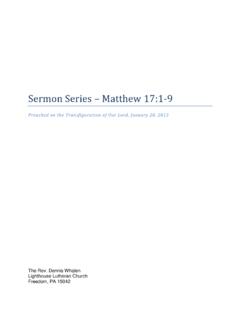Transcription of John 17:20-26 What does Jesus pray for all believers ...
1 john 17:20-26 What does Jesus pray for all believers ?IntroductionWhat is it that has the biggest impact on people in our communities with respect to the good news of the Gospel of Jesus ? Is it the most inspiring praise times in Sunday services? Is it the most uplifting and relevant preaching? Is it the most exciting children s talk? Is it the most warm and inclusive welcome to visitors to our church on a Sunday morning? Is it the quality of tea and coffee or biscuits after the service? Is it the range of ministries and activities we organise? These examples and many more valuable things we can list are all of great importance in the life of a healthy local church. However, none of them would be listed highly by 80%+ of the wider community because they are rarely ever in church on a Sunday to experience these blessings when they occur.
2 Jesus gives a simple test to the wider community to test the genuineness of our claims to be His followers. In john 13:34-35, Jesus declared: 34 A new command I give you: Love one another. As I have loved you, so you must love one another. 35 By this everyone will know that you are My disciples, if you love one another. If the residents of our community all had a secret ballot paper to pass a verdict on each congregation in our community, what scores do you think would be attained? I suspect there would be a lot of nervous anticipation in churches up and down the land if such a vote was ever carried out. Maybe in some cases an encouraging response, but undoubtedly in others the opposite might be the result.
3 Part of the problem in Scotland today is that there are too many examples of un-Christ-like conduct by individual Christians and within and between too many local congregations. There are the inexcusable and illegal acts of child abusers and thieves stealing from the church collections or the occasional conviction of a vicar for conducting bogus marriages which no-one should find acceptable. However, this is not where the problems tend to lie in a far greater number of congregations. There are the inexcusable situations of Christians not talking to other Christians or a whole host of issues surrounding forgiving and being forgiven about past words and actions to which the gospel of grace speaks so clearly.
4 These kinds of issues which have seriously marred the quality of fellowship in too many local congregations damage the credibility of the Christian claims of the people concerned. A local church that avoids the requirement of maintaining high relational standards in its congregation runs the risk of losing its credibility not only in the eyes of the wider community, but also in the eyes of Jesus to whom we must one day given an account. There is also a wider issue here on the topic of Christian unity, in terms of relationships between congregations, both within and between different denominations or networks of churches. The largest body of Baptists in Scotland in the eighteenth century were the Scotch Baptists.
5 Their model of church was primarily lay-elder (male) led and functioned in a similar way to a typical Brethren Assembly in a later century. Scotch Baptists confused unity with uniformity. Within their connexion of churches across the United Kingdom they insisted that every church should conduct its services and ministries in exactly the same way. If a church wanted to do something differently then they had to write to sister churches with a view to all of them adopting or rejecting the proposal in question. It is possibly remarkable that they accomplished so much with such a bureaucratic system, but this was going beyond what Jesus was praying for in john 17. In the same way in Europe the Roman Catholic Church for many centuries maintained a semblance of uniformity by imprisoning or killing people who expressed their faith differently with respect to beliefs and practices.
6 However, if the New Testament ideal of one organic body representing all the Christian communities is unattainable this side of heaven, surely some concerns ought to be expressed about the growing number of Roman Catholic, Orthodox and Protestant denominations and networks of 1churches claiming to be expressing more closely the New Testament blueprint for Church life. In the light of Jesus prayer for His future followers is it not reasonable that we ought to seek to break down unhelpful barriers to fellowship with other Evangelical Churches rather than erecting more barricades? I thank the Lord for the genuine progress witnessed in our city over the last ten years through Dundee Evangelical Christian Alliance, for example.
7 However, much more progress remains to be achieved. What did Jesus pray for us in john 17:20-26 ? My prayer is not for them alone. I pray also for those who will believe in Me through their message, 21 that all of them may be one, Father, just as You are in Me and I am in You. May they also be in us so that the world may believe that You have sent Me. 22 I have given them the glory that You gave Me, that they may be one as We are one 23 I in them and You in Me so that they may be brought to complete unity. Then the world will know that You sent Me and have loved them even as You have loved Father, I want those You have given Me to be with Me where I am, and to see My glory, the glory You have given Me because You loved Me before the creation of the Righteous Father, though the world does not know You, I know You, and they know that You have sent Me.
8 26 I have made You known to them, and will continue to make You known in order that the love You have for Me may be in them and that I myself may be in them.. Let s look briefly at the points Jesus raises in His prayer for us. 1. What does Jesus pray for?The whole prayer is applicable to us because it is God s Word, but this part in particular is specifically directed to us as followers of Jesus in later generations. It is particularly powerful to know that Jesus is praying for each of us as individuals and each local congregation with three main subjects central to His prayers. It is a big hint to us, as a result, concerning our prayer priorities when our Lord and Saviour has revealed what He is most passionate about, as revealed in His prayers.
9 His first major concern: (a)That the Church will be united ( john 17:20-21) 20 My prayer is not for them alone. I pray also for those who will believe in Me through their message, 21 that all of them may be one, Father, just as You are in Me and I am in You. May they also be in us so that the world may believe that You have sent Me. This is not a new biblical emphasis. It was found in the Old Testament as well. Psalm 133:1 declares: How good and pleasant it is when God s people live together in unity! Joseph in Genesis 45:24, after revealing his identity as the Vizier (Prime Minister) of Egypt, had to give this warning to his brothers before they set off to travel home to report to their aged father Jacob: Then he sent his brothers away, and as they were leaving he said to them, Don t quarrel on the way!
10 Yet down the centuries there have been power struggles and divisions that have dishonoured God s name. The disciples of Jesus time and again argued over who was the most important or deserving of honour in their ranks (for example, Mark 9:33-37). In the Early Church Barnabas and Paul had a serious fallout about who to take on their mission team (see Acts 15:36-41). It was not just the men who had problems at times. In Philippians 4:2-3 Paul asks his friend Syzygus to encourage two ladies, former members of one of Paul s mission teams to overcome their differences for the sake of the Gospel. I plead with Euodia and I plead with Syntyche to be of the same mind in the Lord. 3 Yes, and I ask you, loyal Syzygus, help these women since they have contended at my side in the cause of the gospel, along with Clement and the rest of my co-workers, whose names are in the book of life.









